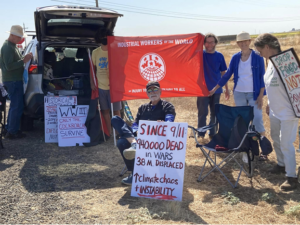by George Gold
guest commentary posted Oct. 26
In September, about a dozen members of the Chico Peace Alliance traveled to the front gate of Beale Air Force Base to deliver a message to pilots and support workers.

We wanted to share our view — not often noted by the defense establishment — about the hazards that are caused by the U.S. military industrial complex. Our view was that peace is more important than war, and that the U.S. defense infrastructure causes a huge negative environmental impact right there in Marysville and around the world.
The U.S. military budget for 2023 was $842 billion. So, let’s see, if we just cut that budget by 10%, that would mean that some $84 billion could be used to provide food to curb the shocking rise in child hunger across the United States, to alleviate the crushing debt of so many students, to solve the devastation of homelessness, to work to address the negative impact of climate change. Hmm… what a concept.
Déjà vu? In the 60s and 70s many of us were college students, trying to manage our educational challenges and yet committed to ending the war in Vietnam. Some of us were at street demonstrations every single weekend and, we succeeded! Because of us, U.S. participation in the Vietnam War ended in 1975.
In 1967, Israel was at war with Egypt and several other neighboring countries. That was over 50 years ago. What has changed? Israel is still at war. The United States is still trying to rule a world that has changed in so many ways. Yet, as a child of Holocaust survivors, my heart is torn between Israel and my desire for peace.
In September 2022, the U.S. Government Accounting Office (GAO) issued a report entitled, “The National Security Snapshot CLIMATE CHANGE RISKS TO NATIONAL SECURITY.”
What do we have to look forward to? Flooding, melting polar ice, human migration trends, rising sea levels, catastrophic storms, and the resulting disruption of U.S. military base utilities.
At Beale, we arrived just before shift change so that our signs of peace, love and “misunderstanding” could be seen as workers left the base.
Cross that white line as you approach the front gate and you can be arrested for trespassing. Where’s that white line? The military police car stationed at the gate will be glad to show you.
We decided that on this visit we would stay behind the line, and thereby we displayed several large banners along both sides of that entry/exit road with our message of peace love and understanding. And, a few of the departing workers actually flashed us the peace sign! But whether flashing a peace sign or not, everyone leaving the base saw us — our signs, our banners and thereby our message.
And we weren’t alone. Aside from a base military police officer’s car that was parked just on the public side of the white line, the entire time we were there, there were three California Highway Patrol vehicles and one county sheriff’s auto parked just about 30 yards from our main set-up location.
Beale Air Force Base’s stated mission is this: “Deliver persistent integrated reconnaissance and combat power.” But at what price?
Some of the environmental concerns associated with U.S. military operations are outlined in the Climate Change/Risk government document. For example:
Base operations: U.S. military bases, both domestically and overseas, require vast amounts of resources, including energy, water and land. The construction and maintenance of these bases can lead to habitat destruction, deforestation and ecosystem disruption.
Training: Military training exercises often involve the use of live ammunition, explosives and heavy equipment. These activities can cause soil erosion, damage to vegetation, and contamination of soil and water with hazardous materials.
Toxic chemicals: Historically, the U.S. military has used a variety of toxic chemicals, such as Agent Orange and depleted uranium, in its operations. These substances have long-lasting and devastating effects on the environment and human health.
Hazardous waste: Over time, military activities generate significant amounts of hazardous waste, including chemicals, fuels and munitions. Improper disposal and management of wastes can lead to soil and water contamination.
Air and water pollution: The operation of military vehicles, aircraft, and ships often contribute to air and water pollution through the emission of greenhouse gases, particulate matter and other pollutants.
Military bases abroad. Placement of U.S. military bases overseas often lead to tensions with local communities and governments over land use, environmental damage and contamination issues.
Climate change: The U.S. military is a significant consumer of fossil fuels, which contributes to greenhouse gas emissions and climate change.
George Gold is an occasional contributor to ChicoSol and a Chico resident.

I wonder how much power we would obtain if we all refused to pay taxes next April?
Project Censored had a report, a while ago, that “nearly all congressmen had investments in war contractors.” What we have here is a clear conflict of interest. There is also the responsibility each of us bears when we buy products that are the fruits of war, like gasoline, jet fuel, bananas, oil, etc. If it isn’t made locally maybe you don’t NEED it.